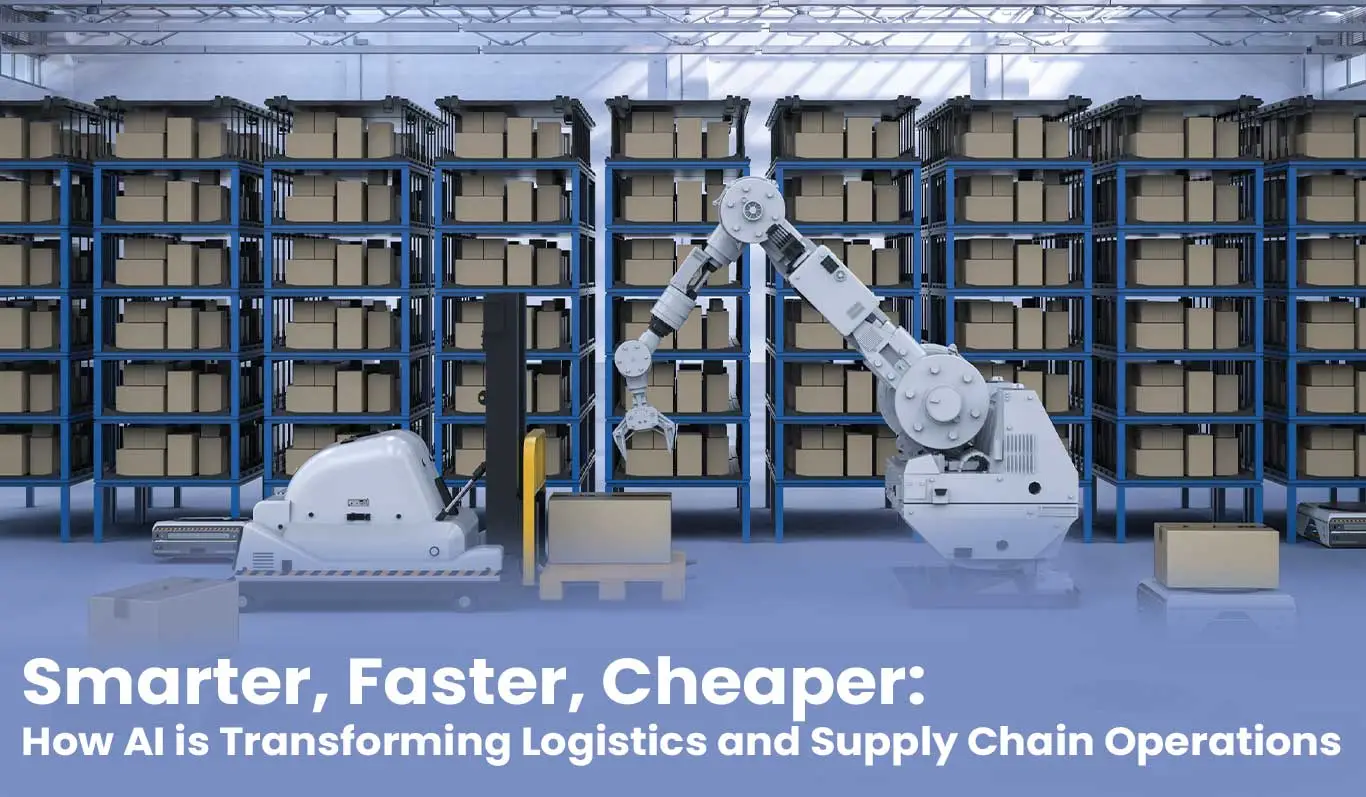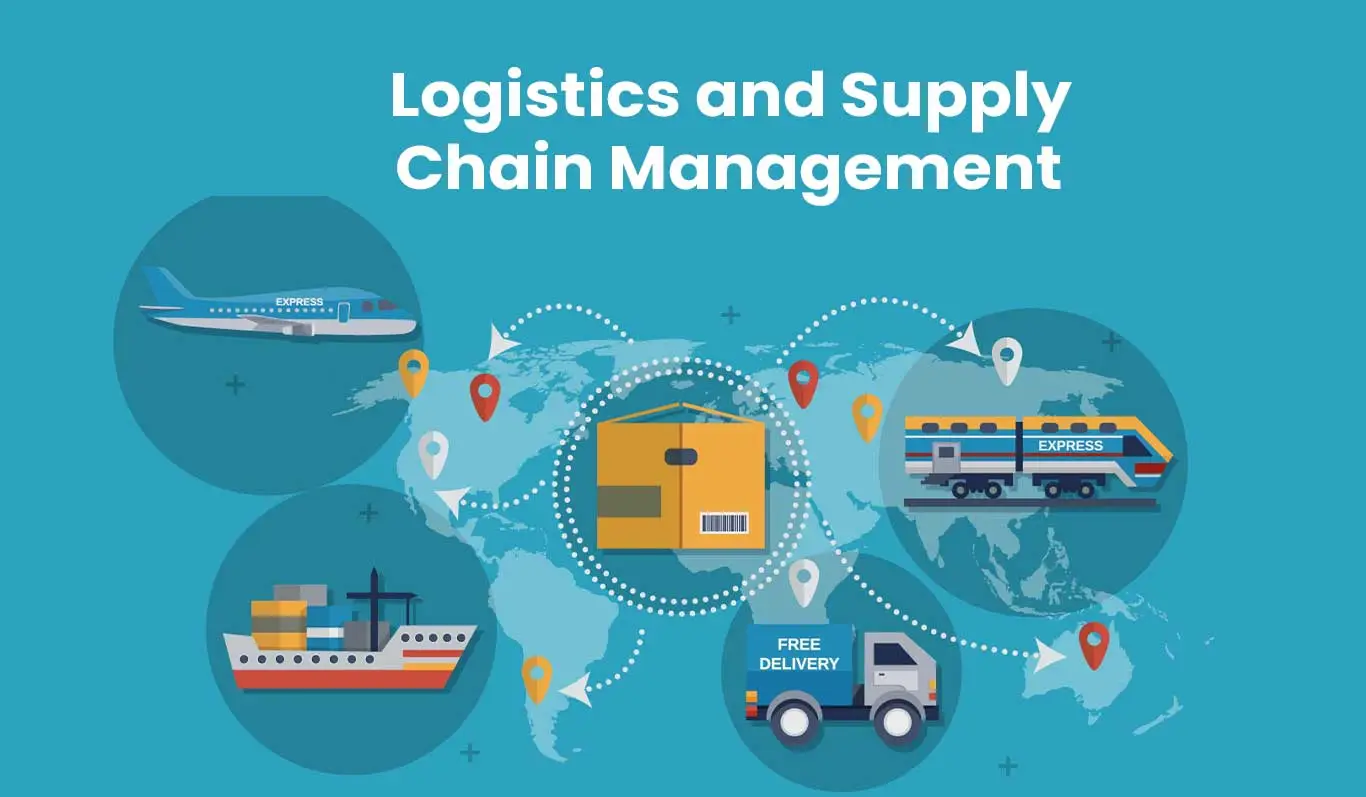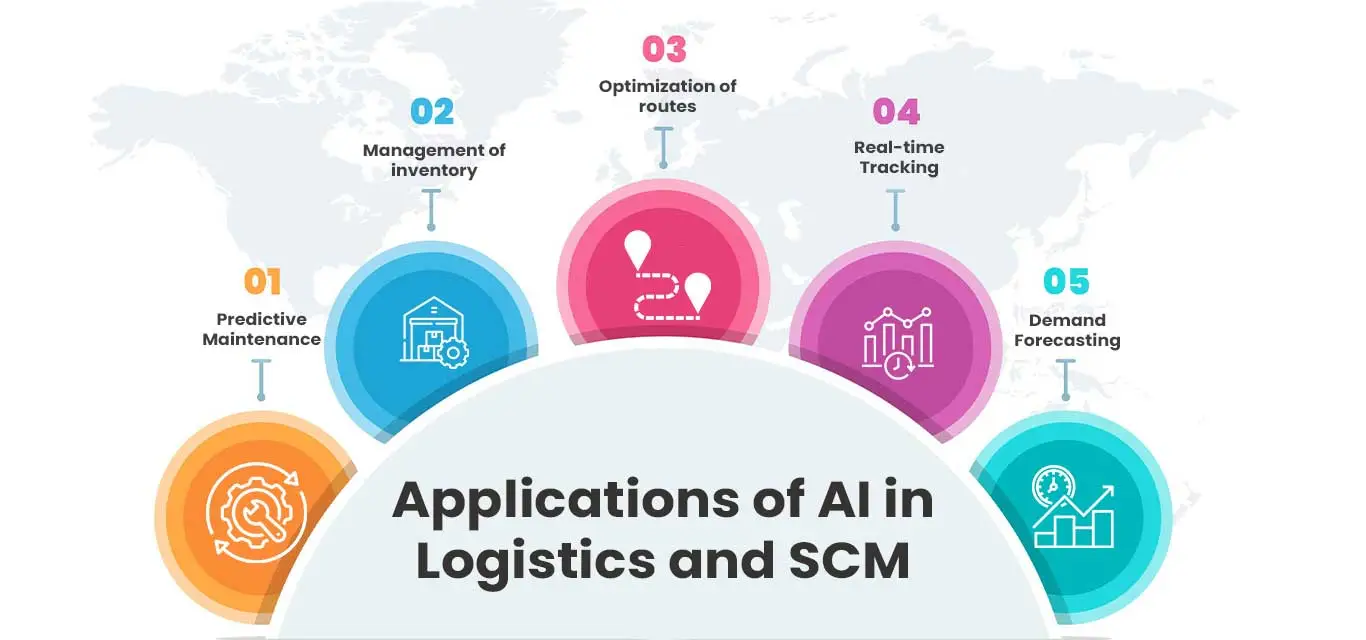Smarter, Faster, Cheaper: How AI is Transforming Logistics and Supply Chain Operations

The power of AI has revolutionized supply chain management. Businesses everywhere save time and money by using AI-based supply chain management to streamline logistics. Optimising operations has never been easier. Get ready for a future in which AI takes the lead in logistics and supply chain management. Learn how AI can revolutionize logistics and supply chain management.
Logistics and Supply Chain Management

Logistics focuses on moving and storing items in a supply chain. The logistics process involves moving and storing goods throughout the supply chain. Logistical processes include demand planning, transportation (including fleet management), inventory management, material handling, and order fulfillment.
The term supply chain management (SCM) refers to all of the activities in this network, including sourcing, manufacturing, transportation, storing, and selling. SCM's ultimate goal is to find processes that ensure an efficient, smooth flow of goods to give customers a positive experience. The SCM also supports all aspects of purchasing, production, and distribution.
The logistics function focuses on intra-company movement of goods, as opposed to supply chain management, which handles activities between different entities.
The Importance Of Logistics & SCM In Modern Business
-
A company's success today depends heavily on the modern practices of supply chain management.
-
It is possible to mitigate the costs associated with the storage and movement of goods through the use of proper logistical systems.
-
At the points of contact, SCM software can help track the activity of goods and maintain an efficient flow of information.
-
Proper inventory control can minimize theft within a company.
-
Green logistics minimizes the impact of technology on natural habitats. With green logistics, the supply chain will focus on reducing carbon footprints and resolving the trade-off between a sustainable environment and economic growth.
Benefits of Implementing Logistics and SCM in Modern Businesses
Supply chain management and logistics contribute to modern businesses' success in the following ways:
Delivering products/services efficiently
By managing logistics and supply chain effectively, businesses can ensure that their products/services are delivered to customers on time and within budget. As a result, customer loyalty and satisfaction can be built, which are crucial for long-term success.
Savings in terms of costs
Logistics and supply chain optimization can reduce transportation, inventory, and warehousing costs for businesses. Profits can increase and the company can gain a competitive advantage.
Productivity is improved
By streamlining processes and eliminating inefficiencies, logistics and supply chain management can boost productivity and reduce waste. A higher output level and faster turnaround time can result in better customer service.
Collaboration enhanced
The logistics and supply chain management process involves collaboration between a variety of stakeholders, including suppliers, distributors, and retailers. A better communication and collaboration between these stakeholders can help businesses build stronger relationships.
Management of risks
Natural disasters, supplier bankruptcy, and transportation delays are among the risks associated with logistics and supply chain management. Business continuity can be ensured through effective risk management strategies.
Applications of AI in Logistics and SCM

Predictive Maintenance
Using AI, you can predict when a machine will fail so that maintenance can be scheduled in advance. By doing this, you can reduce downtime and save money.
Management of inventory
By predicting demand, artificial intelligence can help optimize inventory levels. Increasing efficiency and reducing waste can be achieved through this method.
Optimization of routes
By utilizing artificial intelligence, delivery routes can be optimized to reduce travel time and fuel consumption. As a result, delivery times can be improved and costs can be reduced.
Real-time Tracking
Supply chain visibility can be gained through AI by tracking shipments in real-time. It can help improve customer service and reduce delays.
Demand Forecasting
The use of artificial intelligence can help companies predict product demand, allowing them to adjust production levels accordingly. Improved efficiency and waste reduction can result from this.
How AI is Revolutionizing the Supply Chain?
With the integration of artificial intelligence, the supply chain has become more efficient, cost-effective, and customer-focused. This section explores how AI is transforming the supply chain.
Digitizing Documents and Eliminating Errors
Supply chain processes often require multiple documents to ensure the flow of funds, goods, and information. An issue like human error, missing documents, or other issues could cost thousands, as well as negatively impact the customer experience. The digitization of these documents and electronic data exchange is a key step to cutting supply-chain waste. With AI, paper documents can be digitized, making paperless transactions possible.
Robotics for Automating Repetitive Tasks
Many supply chain applications are currently being automated by robotic systems to automate repetitive tasks, resulting in a reduction in staffing costs, as well as an increase in efficiency.
Cognitive Automation with RPA
Cognitive automation opens up new possibilities for automating business processes, such as Robotic Process Automation (RPA). RPA uses AI technologies like optical character recognition, text analytics, and machine learning to make work easier for customers and workers. Chatbots can be used to answer basic customer questions, for example. Customer service has improved because of chatbots.
Quantifying CO2 Emissions and Data Analysis for Carrier Selection
Technology can also make an immediate impact by quantifying CO2 emissions and using data to determine carrier selection. AI can be used to improve end-to-end logistics execution by connecting key activities such as planning, booking, settlement, and shipment tracking across a vast network of trading partners, thereby ensuring a smooth process from start to finish. There is no doubt that artificial intelligence has the potential to improve a wide range of areas, such as predictive analytics, visibility from end to end, and last mile, to name just a few.
Conclusion
A new era of efficiencies and cost savings has been introduced to the supply chain thanks to artificial intelligence.
Artificial intelligence in the supply chain offers a competitive advantage to companies that adopt it early. From digitizing paper documents to automating repetitive tasks, AI is transforming logistics and supply chain. Data-driven decisions can be made using predictive analytics and real-time visibility in supply chains.
A smarter, faster, and cheaper supply chain has undoubtedly been made possible by artificial intelligence. As companies adopt AI into their supply chain operations, they'll see increased efficiency, better customer service, and a competitive edge.
Request a Quote
Categories
Popular posts
Best Practices for Software Product Engineering Every CTO Should Implement
2023-14-18How to Build Your Own On-Demand Carpooling App Services?
2023-08-25How to Start an On-Demand Fuel Delivery Business: A Comprehensive Guide
2023-07-28Empowering Miners: How Fleet Management Apps are Transforming the Mining Industry?
2023-07-21A Complete Guide to Develop a Food Delivery App for Restaurants in 2023
2023-07-08Mobile Apps Transforming the Travel Industry: A Game-Changer in Travel Planning and Experience
2023-07-07
